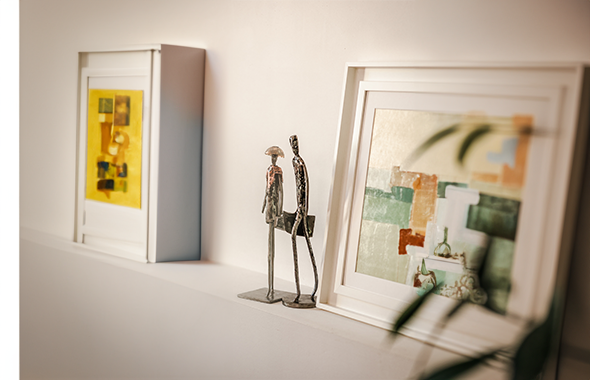
Classic sculptures
Filter
(0 Artworks)
No matches for the requested criteria.
Discover our favorites
More than 30 000 artworks in all styles
More than 30 000 artworks in all styles

Buy a Classic Sculpture from Carré d'artistes
Considering the purchase of a classic sculpture?
Carré d'artistes presents a wide selection of sculptures, including pop art sculptures, resin sculptures, street art sculptures, and classic sculptures.
In this extensive collection, you will find stone sculptures, mixed media sculptures, resin sculptures, modern bronze statues, metal sculptures... all created by our contemporary sculptors. Discover our contemporary sculptures in art galleries and on our website!
In this extensive collection, you will find stone sculptures, mixed media sculptures, resin sculptures, modern bronze statues, metal sculptures... all created by our contemporary sculptors. Discover our contemporary sculptures in art galleries and on our website!
Read more
Explore your options for purchasing a classic sculpture through our vast network of over 600 artists! Save your favorites to your wishlist to stay updated on news from your favorite artists and galleries! Subscribe to our newsletter to receive the latest updates on contemporary art as well.
Art Sculpture: The Classic Style
A classic style in sculpture is easily recognizable: it is figurative, and realism is maximized. Marble is the most commonly used material for these creations. The whiteness of a statue and its high realism are often the defining characteristics of a classic style.
Above all, classic sculpture mainly reproduces human bodies, such as bronze statues of men or women, in a wide range of diverse forms. From children to the elderly, including riders, illustrious figures, or beautiful women, classic sculpture aims to represent the human body as faithfully and diversely as possible.
Techniques of Classic Sculpture
The materials primarily used are marble, stone, bronze, and occasionally clay. The technique employed is stone carving or the use of molds. Sculptors mainly use chisels. Nowadays, techniques can vary more extensively, and they can also be intentionally diverted to create a contemporary work influenced by the classic style.
History and Influences of Classical Greek Sculpture
The history of classical art begins in the archaic period of ancient Greece. In the history of classical art, the first sculptures of this style are recognized through the kouroi, which are standing nude male statues. There is a strong Egyptian influence during this period. Realism is not yet highly emphasized but quickly develops. The classical period of ancient Greece is truly the starting point: the birth of Greek art. Greek sculptors increasingly focus on human anatomy and the study of movement. It is during this period that the famous Doryphoros by Polykleitos is created. This is followed by the Hellenistic period in Greece where sculptures become even more realistic and detailed.
Emphasis is often placed on scenes of life or on the (highly developed) musculature of male subjects. Later, the Roman period adopted this style. Roman artists initially copied Greek artists for a long time before developing their own genre of sculpture. The emphasis is placed on the individual, especially on important figures from the classical era (such as Roman emperors). Moreover, the Romans invented portrait sculpture in bust form, like the bust of Emperor Hadrian (127 AD). Later, the Renaissance looked to the past and revived the previously forgotten codes of classical sculpture. This revival allowed the style to endure in history and paved the way for its further development, such as the invention of the Neoclassical style in the 18th century.
Classical Sculptures of Ancient Greece: An Eternal Artistic Heritage
Classical sculptures hold a special place in art history, especially during the classical period of ancient Greece. These timeless masterpieces have left a lasting impression and influenced numerous artists worldwide.
The classical period in Greece was characterized by the subtle and harmonious representation of the human body, creating a unique and iconic style. Classical sculptures, primarily made of marble but also bronze, are admired and preserved in renowned museums such as the Vatican Museums.
The impact of these sculptures is felt in contemporary art, with artists like Camille Claudel being inspired by this classical aesthetic. Classical Greek sculptures continue to fascinate and be studied worldwide, testifying to their timeless beauty and artistic value.
Roman copies of these sculptures also played a crucial role in their preservation and dissemination throughout the centuries. Thus, classical sculptures are precious testimonies of the art and aesthetics of ancient Greece, which continue to exert a lasting influence on contemporary art.
The Influence of Classical Art in Sculpture
The classical style is associated with the ancient period but can also be found later in history. It continues to influence sculptors of all times, even today. Because this style is oriented towards realism, it is an excellent way to learn sculpture and, most importantly, to accurately reproduce the human body. Therefore, not all classical sculptors are from antiquity or the Renaissance. The influence of the ancient style is such that classical sculptors can be found even in our contemporary era.
At Carré d'artistes, we carefully select art pieces that capture our hearts. Let yourself be tempted by our animal sculptures, metal sculptures, abstract sculptures, or works created by our wood sculptors!
We have a network of over 600 contemporary artists who possess unique sculpting techniques.

2.jpg)

